Table of Contents
Earlier this month, ShaoBank (shaobank.com) collapsed, leaving many victims in its wake.
Marketed as a legitimate financial institution, ShaoBank deceived numerous investors with its fraudulent activities.
This review aims to expose the ShaoBank financial fraud and caution potential investors against similar fraudulent investment schemes.
Key Points
- Fake Hong Kong address
- Warned by the SFC (Hong Kong)
- No tangible products
- Unrealistic returns
- Fake positive reviews
ShaoBank Overview

- Website: shaobank.com
- Addresses: 1 Queen’s Road Central, Central, Hong Kong; 85 Tottenham Ct Rd, London W1T 4TQ, UK
- Company: Shao Limited
- Phone: +852 3960 6571
- Email: customerservice@shaobank.com
- Regulation: Unregulated
Is ShaoBank a Legit Company?
ShaoBank presents itself as a reputable financial entity with a professional website and a listed address in Hong Kong and since 2023 an address in the UK, further complicating the banking scam investigation.
However, ShaoBank does not hold any license to provide banking or financial services.
We have been operating in Hong Kong since 2022 and in the UK since 2023, and we are one of the most trusted neo-banks creating financial solutions for private and corporate clients, worldwide.” – Shaobank.com
The Hong Kong Securities and Futures Commission (SFC) has confirmed that the company does not operate from this location, raising significant concerns about its legitimacy.
Regulatory Warnings
Warning Issued by the SFC Hong Kong
The Securities and Futures Commission (SFC) of Hong Kong has issued a warning regarding ShaoBank, listed on their alert list here.
The warning emphasizes that ShaoBank provides a Hong Kong address but is not actually located there, raising significant concerns about its legitimacy.
Warning Issued by the Hong Kong Monetary Authority (HKMA)
The Hong Kong Monetary Authority (HKMA) has also issued a warning to alert the public about ShaoBank.
According to the HKMA, ShaoBank is not authorized under the Banking Ordinance to conduct banking business or take deposits in Hong Kong.
Additionally, ShaoBank does not have approval to establish a local representative office in Hong Kong.
Warning Issued by the Central Bank of Russia
The Central Bank of Russia has detected signs of a financial pyramid scheme associated with ShaoBank.
More details can be found on their warning list.
These warnings from multiple regulatory bodies underscore the fraudulent nature of ShaoBank and highlight the importance of due diligence when dealing with financial institutions online.
Inside ShaoBank’s Scheme
Domain Registration
The domain shaobank.com was registered on July 17th, 2022, using fraudulent company details.
Yang Shao is listed as the domain owner, further questioning the company’s legitimacy and linking it to fraudulent investment schemes.
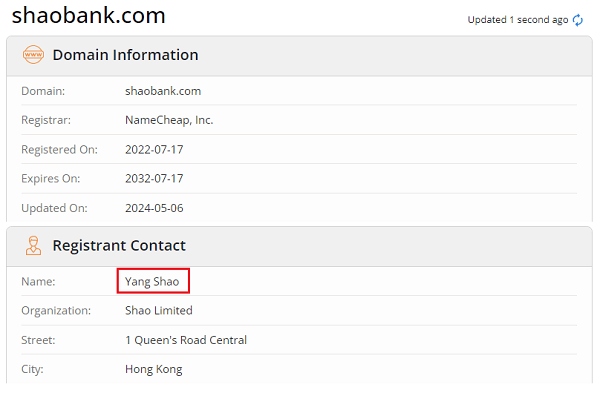
Promoters
ShaoBank used social media promoters worldwide to gain visibility, including:
- Kristhian Seijas (Spain)
- Christian Blanchart (France)
- Nguyen Trung Hien (Vietnam)
- Imad Elmhassani (Morocco)
Most promoters have since deactivated their accounts or gone inactive to evade accountability, typical behavior in banking scams.
The Illusion of Legitimacy
Shell Company Certificates
ShaoBank provides a Hong Kong shell company certificate on its website to create a sense of legitimacy.
However, these certificates are easily obtained and often used by scammers to appear credible. This is a common tactic in Ponzi schemes.
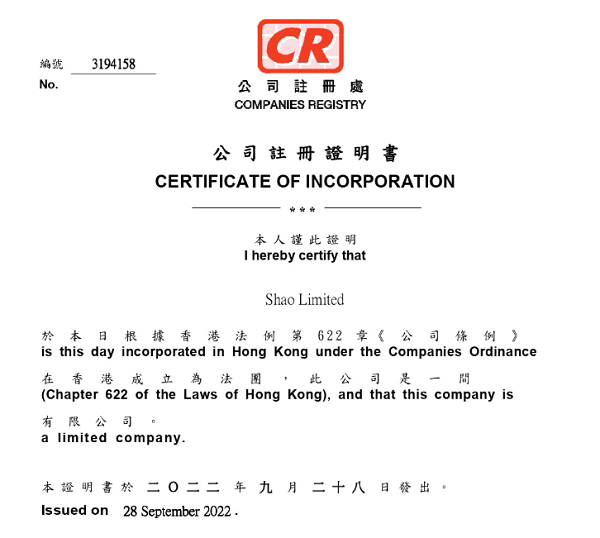
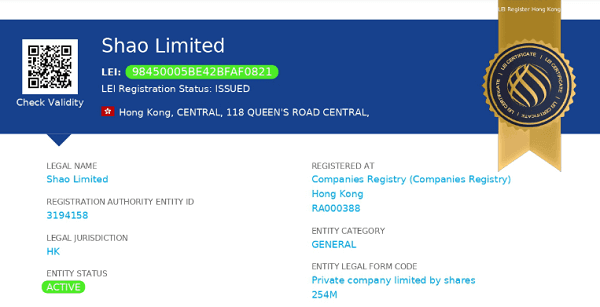
A Suspicious Parent Company
ShaoBank claims to be a subsidiary of Global Future Enterprise Group, a conglomerate involved in various sectors.
…] Global Future Enterprise Group. A parent corporation that oversees companies in the banking, insurance and investment industries.”– Shaobank.com
However, there is little information available about this parent company, raising further red flags.
The lack of transparency is a hallmark of fraudulent financial institutions.
Fake Reviews Online
ShaoBank relies heavily on fake positive reviews on sites like Trustpilot and SiteJabber to appear legitimate.
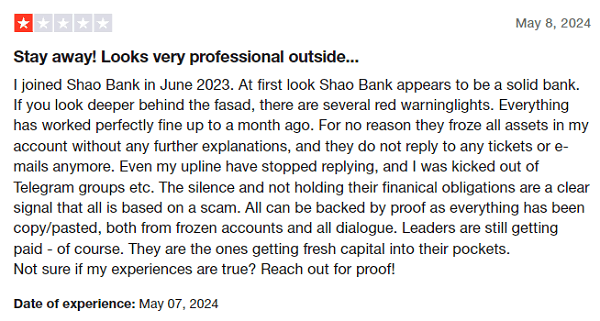
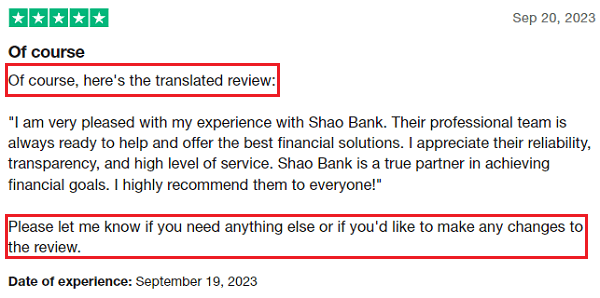

These reviews were likely bought or incentivized, a common tactic among scammers.
Negative reviews from victims surfaced in early 2024, but Trustpilot has since deactivated ShaoBank’s page, reflecting a ShaoBank collapse.
Products and Services
Lack of Tangible Products
ShaoBank offers no tangible products or services. Affiliates can only market ShaoBank’s membership or invest in dubious compensation plans, a characteristic of Ponzi schemes.
Compensation Plan
ShaoBank’s compensation plan involves investing in cryptocurrency, promising unrealistic daily returns based on various investment plans. For example:
| Bond Series | Daily Yield | Yearly Interest Rate |
|---|---|---|
| AA 1 | 0.45% | 162% |
| AA 2 | 0.55% | 198% |
| AA 3 | 0.65% | 234% |
| AA 4 | 0.75% | 270% |
| AA 5 | 0.85% | 306% |
| AA 6 | 0.95% | 342% |
These exorbitant interest rates are typical of fraudulent investment schemes, where early investors are paid with new investors’ money.
Referral Commissions
ShaoBank’s referral commission structure incentivizes recruitment over product sales, another hallmark of Ponzi schemes:
- Level 1: 7%
- Level 2: 3%
- Level 3: 2.5%
- Level 4: 2%
- Level 5: 1.5%
- Levels 6-8: 1%
- Levels 9-10: 0.5%
The Collapse of ShaoBank
Related Domains Shutdown
In May 2024, ShaoBank’s primary domain went offline, marking the collapse of the Ponzi scheme.
ShaoBank attempted to continue its activities through new domains, all of which went offline later that month:
- shaobank.online
- shaobank.biz
- shao.finance
- shao.to
- shao-global.cc
Social Media Channels Closed
ShaoBank also shut down its social media channels after the collapse, including Twitter, Instagram, Facebook, and YouTube.
This is a clear indication of an exit-scam strategy.
The Exit-Scam Strategy
Before collapsing, ShaoBank introduced a cryptocurrency token, KiCoin (KCN), to scam their last dollars from their customer base.
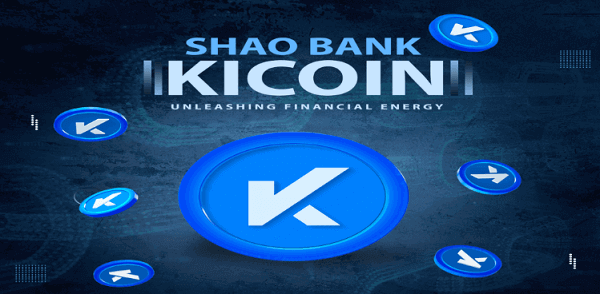
The token aimed to raise $10 million but is now worthless. Such tactics are often employed in fraudulent investment schemes.
Alleged Cyber Attack
ShaoBank claimed to have faced a cyber attack, a common excuse used by failing Ponzi schemes to explain sudden shutdowns and buy time.
This narrative was pushed through their official Telegram group.
Conclusion
Despite regulatory warnings, ShaoBank attracted numerous investors in 2023 by creating an illusion of legitimacy.
The collapse of ShaoBank, marked by the shutdown of its website and the introduction of their token, unfortunately follows the typical pattern of modern Ponzi schemes, leaving many victims in its wake.
FAQs
-
What Exactly is ShaoBank?
ShaoBank presented itself as an online platform providing digital banking and investment services but operated without regulation.
-
Is ShaoBank a Legitimate Company?
No, ShaoBank is not legitimate; regulatory authorities have flagged it for providing a false address and operating without proper authorization.
-
Who Owns ShaoBank?
The real owners of ShaoBank remain unidentified, though the website lists a certain Yang Shao as the founder.
-
Where Does ShaoBank Claim to Operate From?
ShaoBank claims to have locations in Hong Kong and the UK, but it does not operate from the listed addresses.

